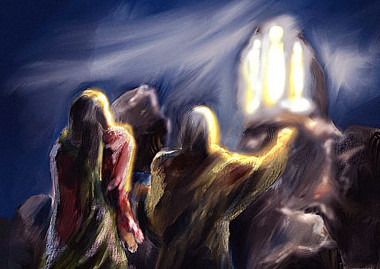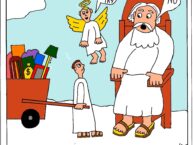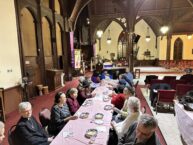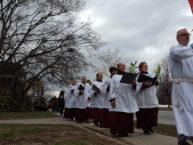 February 7, 2016: May God’s words alone be spoken, may God’s words alone be heard. Amen.
February 7, 2016: May God’s words alone be spoken, may God’s words alone be heard. Amen.
Welcome to the last Sunday in Epiphany. Can you believe that Ash Wednesday is this week? And as we do every year, we end this season of manifestations – epiphanies – with a mountaintop experience.
Now, at convention, we heard about another mountaintop experience. The bishop from that “other New Jersey diocese” spoke at Convention last weekend, and given our bishop is a Red Sox fan, he told a mountain story of his own. I liked it, but thought I’d add my own spin to it:
A Mets fan, a Phillies fan, a Red Sox fan, and a Yankees fan – are climbing a mountain and arguing about who loves their team more. The Phillies fan, sick of hearing the Yankees and Red Sox fans boast the entire trip up the mountain shouts “This is for the Phillies and real baseball in the National League,” and jumps off the side of the mountain as he curses pitchers who don’t bat.
Not to be outdone, the Red Sox fan shouts, “This is for the Red Sox and the American League!” and throws herself off the mountain screaming something about being cursed by Babe Ruth.
The Mets fan, left alone on the mountain with a Yankee fan is next to profess his love for his team, and yells, “This is for everyone!” and pushes the Yankees fan off.
Needless to say, while we root for different teams, the ending wasn’t so different in each version. Pitchers and catchers report in just 11 days – thanks be to God! If you don’t know what that means, consider yourself fortunate not to be wrapped up in baseball insanity.
As odd a journey it was up the mountain (and down) for those baseball fans, mountains have this allure that draw us to them. Mountains beckon us from the horizon, and those that take the time and make the effort to travel up to their peaks are given a great gift – a perspective of the world, and often of their lives, revealed from a far different vantage point than ever before.
Maybe that is why mountaintop experiences find their way into our literature, our bible, and the words of prophets. The naturalist, John Muir, once said, “Climb the mountains and get their good tidings. Nature’s peace will flow into you as sunshine flows into trees. The winds will blow their own freshness into you, and the storms their energy, while cares will drop away from you like the leaves of Autumn.”
And so we have this story about Jesus, and his merry band of followers going up the mountain. But, in the going up, and the coming down, we find out a whole lot more about who he is, and who we are – real epiphanies – and neither of them are about his being lit up like the Vegas strip.
This gospel narrative, found in all three of the synoptic gospels of Matthew, Mark, and Luke, but not in the gospel of John, connects Jesus to the giver of the law – Moses, and to the prophetic Elijah. But also in all three accounts, it is clear that the disciples had already been witness to Peter’s exclamation that Jesus was “the Christ of God,” the anointed one, the messiah. So, the transfiguration wasn’t about coming to understand who Jesus was, and if that’s the case, what exactly was this mountaintop visit all about then?
We find the answer in why they went up there, and what happens AFTER they come down the mountain. They go up there to pray, and when they come down from the mountain, they encounter a man whose son is in need of healing – well, in truth – they are both in need of healing. His son physically, and the dad emotionally and spiritually, right? Anyone who has ever had a loved one who was fighting disease can understand that he too needed help.
Now, the funny thing is, this story about the healing of the epileptic boy is actually optional. It is not part of the required lectionary reading for today. In fact, it isn’t even an option in years A&B when we read from Matthew and Mark. But I can’t imagine telling the transfiguration story, without also telling this story. Because both the trip up the mountain, and Jesus healing the boy, are connected.
Jesus goes up the mountain. But he doesn’t go alone. He brings along Peter, James, and John. It doesn’t really matter who he brought with him – the point was that he had with him his community. In Luke, it is said they made this trip to pray, but in the other two gospels, it was to get some quiet time – to be apart by themselves.
I can sure relate to wanting a bit of rest and quiet – can’t you? We all need it – respite from the world. But how many of us after getting that vacation, feel like we need a vacation from our vacation when we return to our work? Right? And so it goes for Jesus, who returns from the mountaintop only to find out that while he was gone, the people he left in charge haven’t done a thing, and he has to do their work, in addition to his own.
Jesus comes back from his rest to find that the man had first brought his son to his disciples, but they couldn’t cast the boy’s demons out. Jesus is NOT happy to hear that, and wonders how much longer he has to remain with these turkeys (though he used stronger words).
Why is he so angry? I mean, it isn’t like they were the Christ, right?
Well, actually – while Jesus may have been a bit cranky about it – he had a right to expect more from his followers. Jesus is upset because he thought they understood who they were, and that in his short absence, they would live into their identity. They had to, because very soon, he would be physically gone from them for much longer than it takes to go up and down a mountain. They were about to journey to Jerusalem. And Jesus needed them to understand who he was, and who they were, and while they were starting to understand the first part, they just weren’t getting the rest of it. And I think that applies very much to some of us today too.
The reason these two stories are so important for us to read now – the story of the mountaintop, and the story of the possessed boy – is that these are about more than just the disciples of his day. These stories are about us – you and me – and the church.
For far too many years, decades even, Christians have considered themselves followers of Jesus if they went to church on Sunday. And on the other side, the past few years there are those who speak passionately about the “missional” church – that being followers of Christ is not about worship services at all, but about doing the work of Christ in the world. Of course, these are two extreme portraits of the church today, and most are a mix of the two.
There’s a Facebook meme that is popular among the spiritual but not religious folks that says “Going to church doesn’t make you a Christian any more than going to a garage makes you an automobile.” I would argue that this is true…but, it is only partly true. Going to services on Sunday doesn’t make you a Christian, but not going makes it very difficult to be a Christian. To be clear, it isn’t impossible, but for most of us, we need to gather as a faith community. We need this, for the same reason Jesus needed to go up on the mountain to pray – bringing some of his disciples with him. He could have gone on alone, and he sometimes did, just as we often need our alone time. But it is in the context of community that Jesus chose to do his ministry – chose to be revealed – chose to take rest in prayer.
We need one another. Community is important to who we are. And more than that, we need to be fed here, through the love we have for one another, and through the body and blood of Christ. It is here where anyone – no matter what they do for a living, who they love, what language they speak, who they vote for, how much money they make, whether live in the streets or live in a mansion, no matter their race, creed, culture, or ideology – here everyone is equal, loved, and welcomed – sharing in the same word, the same prayers, the same sacrament.
There’s a story one preacher tells about “a young couple that was relatively new to his church, and how they explained to him one day how important church had become for them. Whenever one of them could not make it – if, for instance, of their children was sick – they’d do a quick two-minute drill to check in on the week they’d just been through and the week about to come to determine, as they said, “who needed church more.” “Church is what helps us make sense of our lives,” they explained, “it’s that pick-me-up that connects us with God and our calling and sends us back into the week.”
I think many of us can understand that couple. You likely wouldn’t be here today if that weren’t true – I mean, the church of the holy comforter often calls strongly to us all, right?
But equally true, as I have said many times over – church is not a destination. Church is where we are given strength for the journey. And the journey is what awaits us at the bottom of the mountain. That is why Jesus was so upset with his disciples. They didn’t see who they really were. They had the power to heal that boy, but they couldn’t grasp it. They kept ceding the work of healing a broken world to Jesus. And he calls them a “faithless and perverse generation.”
What does all that mean for us?
The mountaintop experience is the church at worship – the healing of the boy is the church in the world. Or more precisely – the mountaintop experience is what happens to each of us when we gather together on Sundays and experience through word, prayer, and sacrament the real presence of Jesus. And the healing of the boy is what each of us are called to do in the world when we exit our proverbial mountain.
We can’t have one without the other, both are essential to living into who we are.
The transfiguration isn’t about Jesus, but about us – or really, about both. In our worshipping communities, we experience Christ, but if we stay on the moutaintop, if we stay inside the walls of this beautiful church, basking in the glow of Christ’s presence, we render that experience meaningless. We must come down off the mountain, past the walls of our church buildings, and out into the streets – because there we will find people in need of healing. And this is where it gets uncomfortable for us at times – we need to be active agents in the healing.
Now, that might sound strange to think about, but if you really listen to Jesus in this story, he is upset because those disciples didn’t get this most vital part. They understood who he was, and followed him, but they didn’t get that it meant they had work to do…and perhaps most importantly, that they could actually do it! And here’s the kicker folks, if they were looking for Jesus to be there, they only needed to look in the eyes of the boy and his father!
We are the body of Christ in the world, and by our very identity, we are called to go out from this place to heal a broken and hurting world. But if we leave this place thinking we leave Christ behind, we will never see the Jesus that is shining brightly in the eyes of the poor, the lost, the lonely, the afraid, and the marginalized. We will look past them, or worse – pity them and attempt to fix them in some perverse sense of Christian welfare. But Jesus asks more of us – we are to see him in each of them. And to serve them just as we serve him here.
When we can do that – we will have truly been transfigured.
When we can do that – a hurting world has a real chance at being healed.
Jesus is transfigured on a mountaintop – and returns to the world below to offer healing.
Let us do likewise.
Amen.
For the audio of the sermon from the 10:30am service, click here:
The Rev. Diana L. Wilcox
Christ Church in Bloomfield & Glen Ridge
February 7, 2016
Last Sunday After The Epiphany – Year C
1st Reading – Exodus 34:29-35
Psalm 99
2nd Reading – 2 Corinthians 3:12-4:2
Gospel – Luke 9:28-36, [37-43a]






